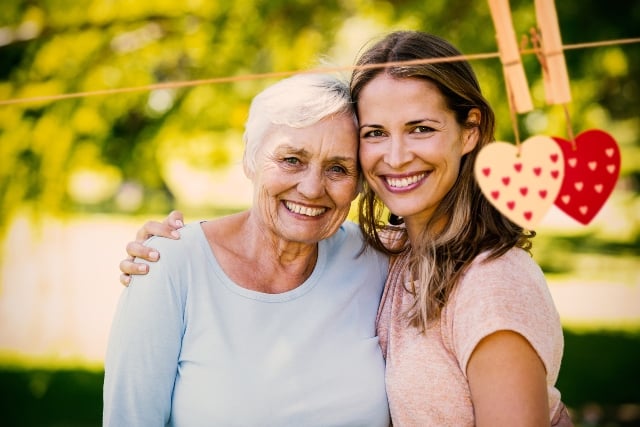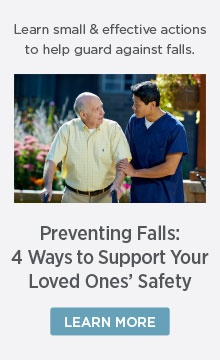
Many caregivers struggle to take the time necessary to care for their own physical health, mental health, and emotional well-being. If you’re caring for an aging parent or senior loved one, we encourage you to incorporate self-compassion into your day. Without caring for yourself, you might run the risk of experiencing caregiver burnout. Remember, practicing self care is not a luxury – it’s a necessity for your health and those around you.
WHAT IS SELF-COMPASSION?
Self-compassion is the practice of intentionally accepting, forgiving, and loving yourself. Just as you tend to the needs of your loved ones, practicing self-compassion will help you care for your own well-being.
Dr. Kristin Neff is an Associate Professor of Educational Psychology at The University of Texas at Austin and acclaimed author of Self-Compassion: The Proven Power of Being Kind to Yourself. According to Dr. Neff’s research, “Individuals who are more self-compassionate tend to have greater happiness, life satisfaction and motivation, better relationships and physical health, and less anxiety and depression. They also have the resilience needed to cope with stressful life events such as divorce, health crises, and academic failure, and even combat trauma.”
We know that many caregivers of aging adults and seniors struggle to balance their many competing priorities, so we’ve put together a list of three self-compassion exercises based on Dr. Neff’s research for caregivers to use when they need comfort.
EXERCISE 1: USE SOOTHING, CARING SELF-TALK
 Changing how you talk to yourself while you’re in the midst of your caregiving tasks can be transformative. This is because these are often the moments when we engage in negative and critical self-talk. The first step in being kind to ourselves is noticing when we are being self-critical.
Changing how you talk to yourself while you’re in the midst of your caregiving tasks can be transformative. This is because these are often the moments when we engage in negative and critical self-talk. The first step in being kind to ourselves is noticing when we are being self-critical.
Next time you are feeling overwhelmed or make a mistake, instead of judging or chiding yourself, try speaking as gently and tenderly as you would to a loved one. Such as, “You’re doing the best you can, and being stressed right now is normal. I know this is hard. I’m here for you.”
You might step outside to speak these words out loud or try placing your hand on your heart and just saying them in your head. Either way, practicing this kind of self-talk will help you acknowledge your feelings and heal your anxieties.
EXERCISE 2: WRITE A LETTER FROM A LOVING FRIEND
Writing is a powerful tool for becoming more in tune with yourself. If there are certain feelings or perceptions that make you feel inadequate, try writing them down, and make note of what emotions arise.
Now that you’ve focused on your perceived ‘inadequacies,’ imagine that you are with an unconditionally kind, loving, and accepting imaginary friend. This friend understands everything about your past, your friends and family, and how you came to become the person who you are – and they love you for all of it.
Write yourself a letter from the view of this unconditionally understanding and loving friend. What would this friend say to you about the judgments you’re making toward yourself? What would they want for you at this moment?
After you’ve written your letter, put it away for a while and come back to it with a fresh mind. (You might even seal it and address it as you would a real letter from a friend!) When you read it, read it slowly – taking the words to heart and letting them comfort you.
EXERCISE 3: TAKE A SELF-COMPASSION BREAK
This might sound simple, but acknowledging you want a moment to yourself is an act of self-kindness. If you are feeling frustrated or stressed, put your hand on your heart and take a few moments to soothe yourself by speaking to yourself the following phrases.
- First, acknowledge how you are feeling. You might say, “I’m stressed,” “I’m hurting,” or, “I’m tired.” This allows you to be more mindful of your present situation.
- Secondly, recognize that you are not alone. By recognizing that many people have experiences similar to yours, you will be connected to greater humanity, and feel less isolated. You might say, “I know other people feel this way, too,” or “All people face challenges in their lives.”
- Finally, offer yourself compassion. Some phrases could be, “May I be safe and strong,” “May I accept myself,” or “May I be happy and healthy.”
Practicing self-compassion will not only help you care for yourself, but it will also help you uplift those around you. If you are ever in need of additional support or would like to discuss available resources for caregivers, team members at The Goodman Group and their managed communities are always here to help.

